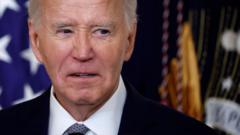In the wide-ranging interview with Susan Page, Biden mentioned his contemplation of pre-emptive pardons for several of Trump's critics, including former Republican congresswoman Liz Cheney and former senior health official Dr. Anthony Fauci. He recounted a post-election Oval Office meeting with Trump, where he tried to emphasize that seeking retribution against critics was not in the best interest of his opponent. Biden stated that Trump appeared receptive, simply listening to his viewpoint.
Biden's decision regarding any pardons will potentially hinge on the composition of Trump's future cabinet. Furthermore, during the same interview, Biden defended the pardon he granted to his son, Hunter Biden, despite previously rejecting the notion of extending clemency to family members facing legal troubles.
Biden's remarks come at a time when Democratic party insiders express concern about the implications of his age for the party's prospects. The president admitted that, "based on polling," he felt confident about his chances against Trump, yet acknowledged that his age could have been a factor if he had remained in the presidential race. Following Vice President Kamala Harris' defeat in the election, influential Democratic figures, including former House Speaker Nancy Pelosi, suggested that Biden's premature exit from the race might have yielded better results for the party.
As Biden navigates his post-presidency period, questions remain regarding his future political ambitions and the impact of his age on his legacy.
Biden's decision regarding any pardons will potentially hinge on the composition of Trump's future cabinet. Furthermore, during the same interview, Biden defended the pardon he granted to his son, Hunter Biden, despite previously rejecting the notion of extending clemency to family members facing legal troubles.
Biden's remarks come at a time when Democratic party insiders express concern about the implications of his age for the party's prospects. The president admitted that, "based on polling," he felt confident about his chances against Trump, yet acknowledged that his age could have been a factor if he had remained in the presidential race. Following Vice President Kamala Harris' defeat in the election, influential Democratic figures, including former House Speaker Nancy Pelosi, suggested that Biden's premature exit from the race might have yielded better results for the party.
As Biden navigates his post-presidency period, questions remain regarding his future political ambitions and the impact of his age on his legacy.























